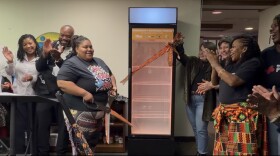While grocery stores have adjusted to higher demands and farmers markets wrap up their season, 2020 has made a lot of people think more about how they get their food.
In March, searches for community supported agriculture, or CSAs, jumped during the initial stages of the coronavirus pandemic when grocery stores shelves were picked clean. But where grocery stores may have left a gap, local farms and CSA groups have swept in to take advantage of an opportunity to reach new audiences.
Culinary historian and Lake Effect contributor Kyle Cherek says this is because of how the pandemic has affected food supply chains. Because restaurants are buying less food and shoppers are going to the grocery store less often, food is not moving through the chain as quickly as before the pandemic. This has led to complaints of less fresh produce and other ingredients spoiling more quickly.
When the produce is being grown in your community, worries about food items being fresh disappear.
“If you pick up at your CSA on Saturday, the stuff was probably pulled out of the ground either that morning or Friday and there’s just no grocer in the world that can come close to touching that,” says Cherek.
Here are four resources Cherek recommends to get started with a CSA:
1. Living off the Fat of the Land Community Farm CSA (LotFotL)
The farm is located outside of Delavan, Wis., with pick-ups across Milwaukee, Shorewood, and New Berlin. This CSA has expanded its reach beyond just fresh produce and is trying to provide a range of fresh food from their farm.
“LotFotL has everything from cheese, we get all of our meats there, of course, all the produce, get breads, tortillas. Except for, like I said, the paper goods and some cleaning products … we don’t need to go to the grocery store,” says Cherek.
While Imperfect Foods is based in San Francisco, it delivers food that was rejected by grocery stores for cosmetic reasons all across the country. Over the last decade, an average of $161 billion a year of food goes to waste in the U.S., according to Cherek. Often times though, this food can be almost indistinguishable from the grocery store.
“[My wife and I] challenge each other and say find the imperfection, like I can’t figure out what is wrong with this apple or these peaches or this butter,” notes Cherek.
Milwaukee Farmers United is a collaboration between local farms to create an online marketplace for their products that can be delivered right to your door. Products range from coffee to flowers to cheese.
“It’s way more than just tomatoes and broccoli. And whenever you buy local, more than 60 cents of your dollar stays in your community and how can that not be a good thing?” says Cherek.
Farm Fresh Atlas is an aggregator for information about local and sustainable places to purchase food in Wisconsin. It can help you find a restaurant, CSA, or farmers market nearby.
“[Farm Fresh Atlas] shows this abundance of farms, and do they have CSA’s — do you drive up or how do you get subscription to their vegetables and what do they sell? There’s everything from buffalo meat to, we’ve gotten a turkey from Farm Fresh Atlas,” says Cherek.








